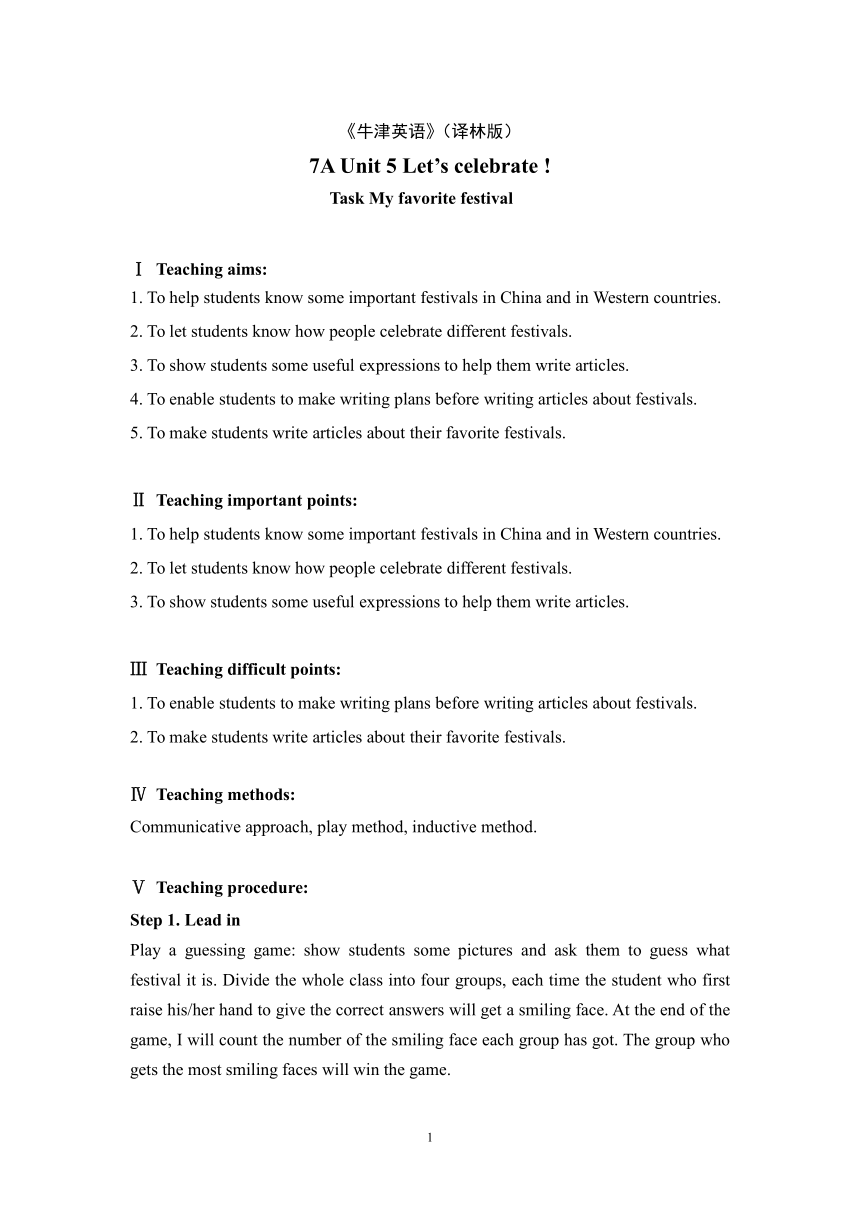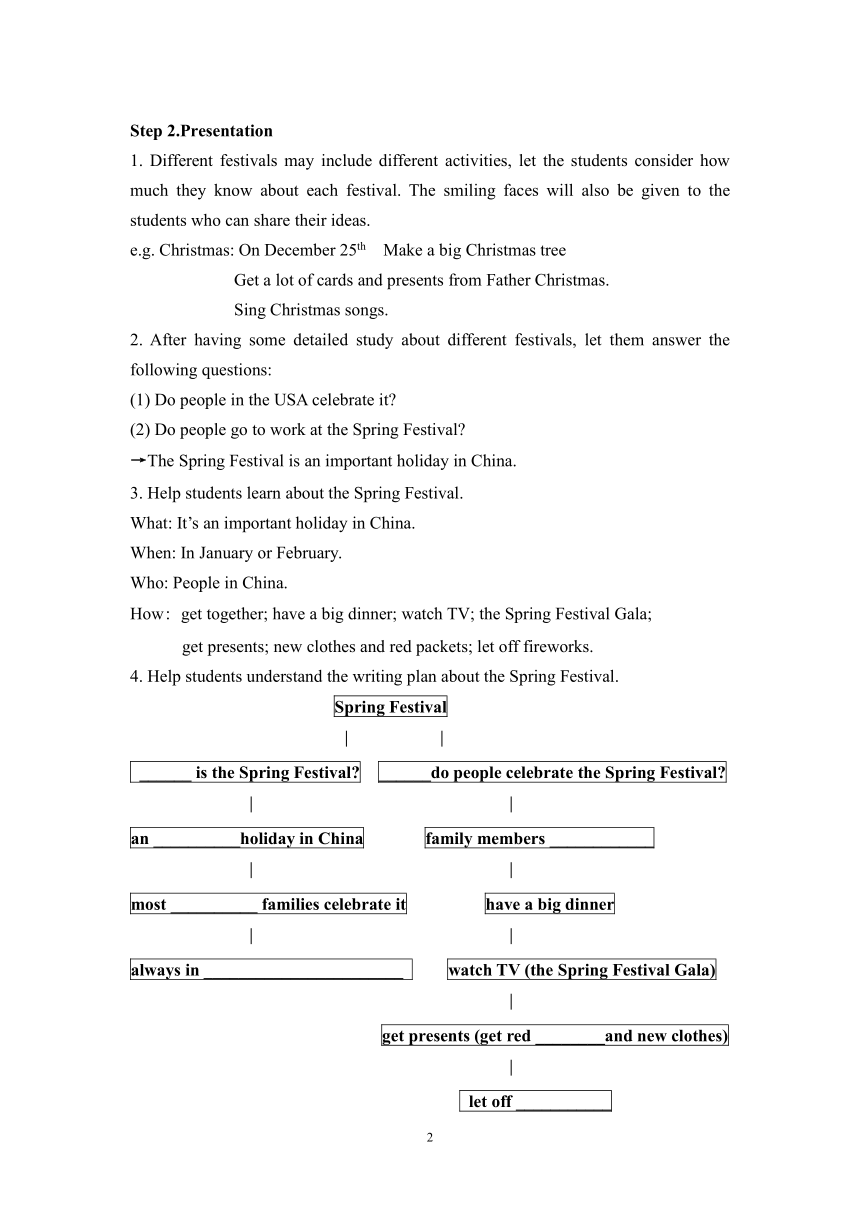Unit 5 Let’s celebrate Task My favourite festival 教案
文档属性
| 名称 | Unit 5 Let’s celebrate Task My favourite festival 教案 |  | |
| 格式 | doc | ||
| 文件大小 | 1.3MB | ||
| 资源类型 | 教案 | ||
| 版本资源 | 牛津译林版 | ||
| 科目 | 英语 | ||
| 更新时间 | 2022-06-21 09:38:28 | ||
图片预览


文档简介
《牛津英语》(译林版)
7A Unit 5 Let’s celebrate !
Task My favorite festival
Ⅰ Teaching aims:
1. To help students know some important festivals in China and in Western countries.
2. To let students know how people celebrate different festivals.
3. To show students some useful expressions to help them write articles.
4. To enable students to make writing plans before writing articles about festivals.
5. To make students write articles about their favorite festivals.
Ⅱ Teaching important points:
1. To help students know some important festivals in China and in Western countries.
2. To let students know how people celebrate different festivals.
3. To show students some useful expressions to help them write articles.
Ⅲ Teaching difficult points:
1. To enable students to make writing plans before writing articles about festivals.
2. To make students write articles about their favorite festivals.
Ⅳ Teaching methods:
Communicative approach, play method, inductive method.
Ⅴ Teaching procedure:
Step 1. Lead in
Play a guessing game: show students some pictures and ask them to guess what festival it is. Divide the whole class into four groups, each time the student who first raise his/her hand to give the correct answers will get a smiling face. At the end of the game, I will count the number of the smiling face each group has got. The group who gets the most smiling faces will win the game.
Step 2.Presentation
1. Different festivals may include different activities, let the students consider how much they know about each festival. The smiling faces will also be given to the students who can share their ideas.
e.g. Christmas: On December 25th Make a big Christmas tree
Get a lot of cards and presents from Father Christmas.
Sing Christmas songs.
2. After having some detailed study about different festivals, let them answer the following questions:
(1) Do people in the USA celebrate it
(2) Do people go to work at the Spring Festival
→The Spring Festival is an important holiday in China.
3. Help students learn about the Spring Festival.
What: It’s an important holiday in China.
When: In January or February.
Who: People in China.
How: get together; have a big dinner; watch TV; the Spring Festival Gala;
get presents; new clothes and red packets; let off fireworks.
4. Help students understand the writing plan about the Spring Festival.
Spring Festival
︱ ︱
______ is the Spring Festival ______do people celebrate the Spring Festival
︱ ︱
an __________holiday in China family members ____________
︱ ︱
most __________ families celebrate it have a big dinner
︱ ︱
always in _______________________ watch TV (the Spring Festival Gala)
︱
get presents (get red ________and new clothes)
︱
let off ___________
5. Complete Millie’s article on Page 67 according to the writing plan.
Step 3.Analyzing the structure
1. Help students analyze the structure of Millie’s article.
The Spring Festival → Name of the festival
The Spring Festival is an important holiday in China. Most Chinese families celebrate it. ↓
Paragraph 1: What is it Who celebrate it
It is always in January or February. It is often cold at this time of year, but people are happy. Family members get together and then have a big dinner. After dinner, people like to watch TV. There is a great Spring Festival Gala on TV every year.
↓
Paragraph 2: When is it How do people celebrate it
Children have lots of fun on this day. We get presents. Usually our parents get new clothes ready for us, and we get red packets from our grandparents, parents, aunts and uncles. We like to let off fireworks at night. They are really wonderful!
↓
Paragraph 3: How do children celebrate it
2. How to write articles about festivals.
Introduction: what, when, who
Details: how→what do people do
Summary: feelings
Step 4. Writing
1. Ask students to make writing plans about their favorite festival. (I will hand out the paper to the students.)
2. Let some students show their writing plans to the whole class.
3. Show them some useful expressions to help them write articles about their favorite festivals.
…is an important holiday in/for
It is in / on…
It is .., but…
There is /are ...on TV…
We / they like to …
Usually we get …
…have lots of fun…
4. Finish writing the article.
7A Unit 5 Let’s celebrate !
Task My favorite festival
Ⅰ Teaching aims:
1. To help students know some important festivals in China and in Western countries.
2. To let students know how people celebrate different festivals.
3. To show students some useful expressions to help them write articles.
4. To enable students to make writing plans before writing articles about festivals.
5. To make students write articles about their favorite festivals.
Ⅱ Teaching important points:
1. To help students know some important festivals in China and in Western countries.
2. To let students know how people celebrate different festivals.
3. To show students some useful expressions to help them write articles.
Ⅲ Teaching difficult points:
1. To enable students to make writing plans before writing articles about festivals.
2. To make students write articles about their favorite festivals.
Ⅳ Teaching methods:
Communicative approach, play method, inductive method.
Ⅴ Teaching procedure:
Step 1. Lead in
Play a guessing game: show students some pictures and ask them to guess what festival it is. Divide the whole class into four groups, each time the student who first raise his/her hand to give the correct answers will get a smiling face. At the end of the game, I will count the number of the smiling face each group has got. The group who gets the most smiling faces will win the game.
Step 2.Presentation
1. Different festivals may include different activities, let the students consider how much they know about each festival. The smiling faces will also be given to the students who can share their ideas.
e.g. Christmas: On December 25th Make a big Christmas tree
Get a lot of cards and presents from Father Christmas.
Sing Christmas songs.
2. After having some detailed study about different festivals, let them answer the following questions:
(1) Do people in the USA celebrate it
(2) Do people go to work at the Spring Festival
→The Spring Festival is an important holiday in China.
3. Help students learn about the Spring Festival.
What: It’s an important holiday in China.
When: In January or February.
Who: People in China.
How: get together; have a big dinner; watch TV; the Spring Festival Gala;
get presents; new clothes and red packets; let off fireworks.
4. Help students understand the writing plan about the Spring Festival.
Spring Festival
︱ ︱
______ is the Spring Festival ______do people celebrate the Spring Festival
︱ ︱
an __________holiday in China family members ____________
︱ ︱
most __________ families celebrate it have a big dinner
︱ ︱
always in _______________________ watch TV (the Spring Festival Gala)
︱
get presents (get red ________and new clothes)
︱
let off ___________
5. Complete Millie’s article on Page 67 according to the writing plan.
Step 3.Analyzing the structure
1. Help students analyze the structure of Millie’s article.
The Spring Festival → Name of the festival
The Spring Festival is an important holiday in China. Most Chinese families celebrate it. ↓
Paragraph 1: What is it Who celebrate it
It is always in January or February. It is often cold at this time of year, but people are happy. Family members get together and then have a big dinner. After dinner, people like to watch TV. There is a great Spring Festival Gala on TV every year.
↓
Paragraph 2: When is it How do people celebrate it
Children have lots of fun on this day. We get presents. Usually our parents get new clothes ready for us, and we get red packets from our grandparents, parents, aunts and uncles. We like to let off fireworks at night. They are really wonderful!
↓
Paragraph 3: How do children celebrate it
2. How to write articles about festivals.
Introduction: what, when, who
Details: how→what do people do
Summary: feelings
Step 4. Writing
1. Ask students to make writing plans about their favorite festival. (I will hand out the paper to the students.)
2. Let some students show their writing plans to the whole class.
3. Show them some useful expressions to help them write articles about their favorite festivals.
…is an important holiday in/for
It is in / on…
It is .., but…
There is /are ...on TV…
We / they like to …
Usually we get …
…have lots of fun…
4. Finish writing the article.
同课章节目录
- 预备课程
- Lesson 1 Nice to meet you !
- Lesson 2 A happy family
- Lesson 3 A nice school
- Lesson 4 You look cool !
- Lesson 5 Wonderful things
- Lesson 6 Have nice food
- Lesson 7 Enjoy our days
- Lesson 8 Let's have fun !
- Unit 1 This is me
- Unit 2 Let's play sports
- Unit 3 Welcome to our school
- Unit 4 My day
- Unit 5 Let’s celebrate
- Unit 6 Food and lifestyle
- Unit 7 Shopping
- Unit 8 Fashion
